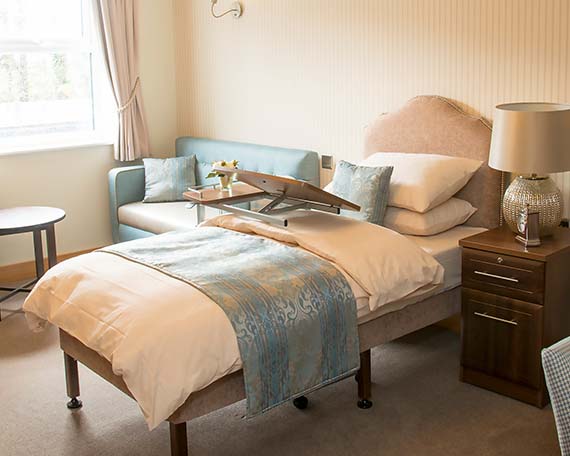How Can a Care Home Help Those Living With Dementia?

If your loved one is living with dementia, you may have come to a point when you want to talk about moving into a care home, and if you hold power of attorney, you can make decisions on their behalf. It is important to do thorough research and seek advice from a team of care professionals so that you find the best care home for their overall needs.
In order to provide a better understanding of dementia care homes, we have covered all the main points on how a dementia care home can provide the best care and support for your loved one.
What is Dementia?
Dementia is a long-term progressive neurological condition that affects cognitive function, including memory, mental capacity, language, and reasoning. There are many different types of dementia, including:
- Alzheimer's Disease: Characterised by memory loss, cognitive decline, and behavioural changes, Alzheimer's is the most common form of dementia.
- Vascular Dementia: Caused by restricted blood flow to the brain, vascular dementia results in cognitive decline. It often follows a stroke or other vascular issues affecting the brain.
- Lewy Body Dementia (LBD): LBD involves abnormal protein deposits, known as Lewy bodies, in the brain. It leads to cognitive fluctuations, visual hallucinations, and motor symptoms similar to Parkinson's disease.
- Frontotemporal Dementia (FTD): FTD affects the frontal and temporal lobes of the brain, leading to personality changes, language difficulties, and behavioral alterations. It is less common than Alzheimer's and affects younger individuals.
- Mixed Dementia: Some individuals may experience a combination of different types of dementia, such as Alzheimer's and vascular dementia, leading to a mixed presentation of symptoms.
- Creutzfeldt-Jakob Disease (CJD): CJD is a rare, degenerative, and rapidly progressing form of dementia caused by abnormal proteins called prions. It results in severe neurological symptoms and a rapid decline in cognitive function.
These are just a few examples of the diverse types of dementia, each with its unique characteristics, progression, and underlying causes. Early diagnosis and personalised care plans are crucial in managing the symptoms and improving the quality of life for individuals with dementia.
While there is no cure for dementia, there are treatments and therapies that can help manage symptoms and slow the progression of the disease. The following websites specialise in Dementia and can offer expert advice and information:

When Should Someone With Dementia Go Into a Care Home?
For family members and caregivers, caring for a loved one with dementia can be challenging, particularly as the condition progresses and the symptoms worsen. However, residential dementia care homes and nursing homes can provide a range of benefits to the person living with dementia, helping them to maintain their independence, improve their quality of life, and ensure their safety and well-being stay the top priority.
An ideal time to begin considering a dementia friendly care home would be when either the individual or the carer struggle to provide them the level of independence or support that they deserve. Whether this is due to forgetting to take medication, becoming prone to falls or having an increase in confusion, a care home can provide an environment where those living with dementia can enjoy a better quality of life.
Dementia care in a care home involves providing support and assistance to those living with dementia. This can include help with everyday tasks, such as personal care, dressing, bathing, and eating, as well as providing emotional support and companionship. Some care homes are designed to provide specialised dementia care 24/7 that is tailored to the individual needs of each resident.
What Are The Benefits of Dementia Care?
There are many benefits to receiving dementia care in a care home setting including the following:
Care Unique to Each Individual
Dementia care in a care home is designed to be personalised to the individual needs of each resident. The dementia care team work closely with the resident and their loved ones prior to them moving in to create a personalised care plan tailored to their needs and requirements whilst they support the person on a day-to-day basis.
Residents will be closely monitored to ensure they are always receiving the right care for their needs. Family and friends can visit at any time to continue creating special memories.
A Safe Environment
Care homes provide a safe and secure environment for those living with dementia. This can include secure outdoor spaces, access to emergency response systems, staff trained in managing specific needs and support aids such as rails, walking frames and profiling beds.
In order to ensure residents feel as comfortable as possible, the majority of care homes will include furniture with contrasting colours, signs above doorways, spacious hallways and personalised bedrooms.
Care homes can provide a consistent and familiar environment that can help to reduce feelings of confusion and disorientation for the residents, which makes it easier for them to feel relaxed and focus on a specific task or activity.
Engaging Activities
Care homes typically offer a range of activities designed to benefit residents with dementia. These activities may include memory games, arts and crafts, music therapy, exercise classes, and social events such as movie nights or parties.
Participating in these activities can help residents maintain cognitive function, improve their physical health, reduce feelings of isolation and depression, and enhance their overall quality of life. Additionally, these activities can provide residents with a sense of purpose, help them feel valued and connected to others, and may even help to slow the progression of dementia symptoms.
By providing tailored activities and support, residential dementia care homes can help residents live with greater comfort, dignity, and fulfilment.
A Structured Routine
Many people with dementia benefit from a structured routine, and care homes offer this by providing regular meals, medication management, and daily activities that help residents to maintain a sense of purpose and routine.
A care home will offer a daily schedule of activities which help residents to maintain cognitive function and physical health. Care homes provide regular meals and snacks at set times, ensuring that residents receive proper nutrition and hydration.
A care team will oversee medication management, ensuring that residents take their medication on time and in the correct dosage. Residents can also expect a regular sleep schedule, with set bedtimes and wake-up times. This helps to regulate residents' circadian rhythms and promotes good sleep hygiene, which is important for overall health and well-being.

Dementia Care at The Porterbrook Care Home
The Porterbrook Care Home is a purpose-built home located in the Crosspool suburbs of Sheffield. We offer unrivalled levels of Dementia Care, as well as Residential Dementia Care, Residential Care and Respite Care. We take pride in being able to offer our residents a pleasant environment, and exceptional care and support through our services and beautiful facilities for them to live happy and fulfilled life.
The Porterbrook has a dedicated team of health and social care professionals trained in dementia care, who go above and beyond to ensure residents receive the highest quality of care.
Our care home has been purposefully built with our dementia residents in mind. Our team has undertaken extensive training to manage the symptoms associated with dementia. At The Porterbrook, our all-inclusive services are available when it suits our residents, giving them as much choice and independence as they like. For example, the hair salon & treatment room is always open and residents can have their hair done by a personal hairdresser if they prefer; helping to support familiarity and routine.
Our in-house chef takes the time to learn each resident’s food preferences and goes the extra mile to incorporate residents' favourite meals on a regular basis. Residents have the choice of enjoying their meals wherever they want to when it suits them best, whether in one of our dining rooms, their bedroom or they can even get food to go at the bar. It’s the little things that can help make the biggest difference in our residents’ lives.
"My husband has PCA, a rare form of dementia and has been at the Porterbrook for 4 years. I have been very impressed with the care that he has received and every time I visit him, he seems settled. I recently had a week's respite care for myself at The Porterbrook and it gave me the opportunity to observe the care that was being given 24/7."
"What immediately struck me was how lovely all the carers were with the residents and they obviously saw each one as an individual so their interactions with them varied according to what worked best. It is rare to be able to observe carers in action but I came away thinking that it would be impossible to find a better care home in terms of the support they give to the residents and to the relatives."
"It is clear that the manager, who has been in the post for about 18 months, has implemented processes which make everything run much more smoothly and there is always a cheerful atmosphere when I visit." - 5* Review by J H (Respite Resident) on carehome.co.uk



We Welcome You to Contact Us at The Porterbrook Care Home
If you would like to find a care home for your loved one with dementia, look no further than The Porterbrook. The friendly team will happily answer your questions and arrange a visit to our care home in Sheffield.
We are available to contact by phone on 0114 266 0808 or via email manager@theporterbrookcare.com. We look forward to speaking with you soon.





